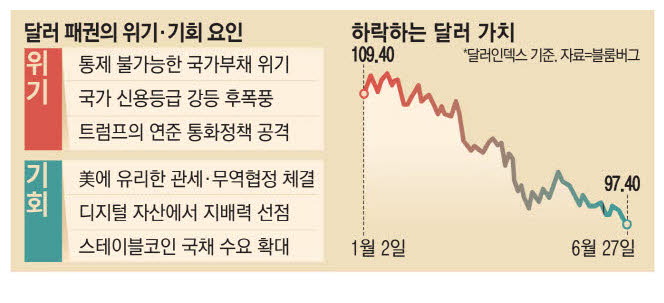 사진 확대
사진 확대 U.S. President Donald Trump’s tax cut policy and pressure on the Federal Reserve System (Fed) shake the dollar’s safe asset status, according to a report. Nine out of 10 economists are worried about the dollar’s safe-haven status.
According to a survey released by the Financial Times (FT) on the 29th (local time), more than 90% of respondents said they were “concerned” about weakening the role of safe assets in dollar-denominated assets within 5 to 10 years (“somewhat” about 60% and “very” about 30%). Less than 10% of respondents said they were not concerned. The survey was conducted by the FT in June on 47 economists with the Kent A Clark Global Market Center under the University of Chicago Business School.
The FT reported that the Trump administration’s fiscal policy, including concerns over President Trump’s undermining of the Fed’s independence and tax cuts, resulted in such a result. In April, after President Trump’s unilateral announcement of mutual tariffs, U.S. stock prices, government bond prices and the dollar showed a “triple weakness.” Of these, the dollar has continued to weaken until recently. The dollar index, which shows the value of the dollar against the currencies of the six major economies, is at the 97-point level, the lowest level in three years.
“Swiss francs and gold look like safe assets,” University of Texas professor Saroj Bhattarai told the FT. “The United States is like an emerging market. Political uncertainty raises the risk premium (up money) and leads to a rise in interest rates on long-term bonds and a fall in the value of the currency, he explained. “The fiscal deficit, the government’s deliberate action to weaken the dollar’s value, the uncertainty surrounding the incoming Fed chairman and the issue of Fed independence are all working negatively,” said Anna Chieslak, a professor at Duke University.
President Trump is pushing for a so-called “one big and beautiful bill” that includes corporate tax cuts and income tax cuts. The bill was passed with 51 votes in favor and 49 against in a June 28 vote on the federal Senate procedure, crossing the first hurdle of the Senate passage. The non-partisan Congressional Budget Office (CBO) estimates that if the bill is passed, federal debt will increase by about $3.3 trillion over the next decade. “Breathtaking fiscal policy abuse is almost certain,” said Robert Barbera, director of the Johns Hopkins University Financial Economy Center. “The perception of dollar assets can change.”
“If President Trump dismisses Fed Chairman Jerome Powell or names a successor in advance, he will shift my concerns about dollar assets from ‘some’ to ‘very’,” he said. President Trump continues to attack Powell as he criticizes his reluctance to cut interest rates.
[Reporter Kim Deoksik]